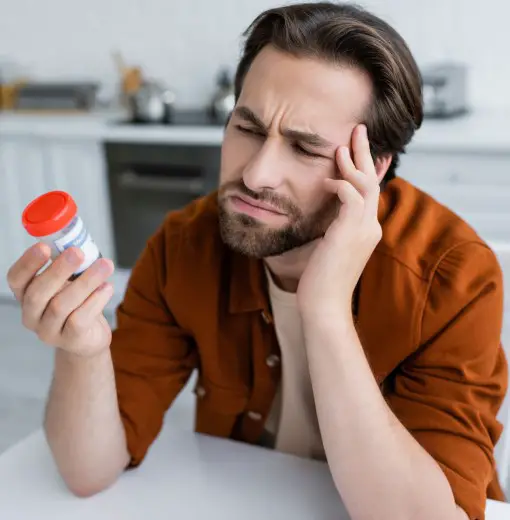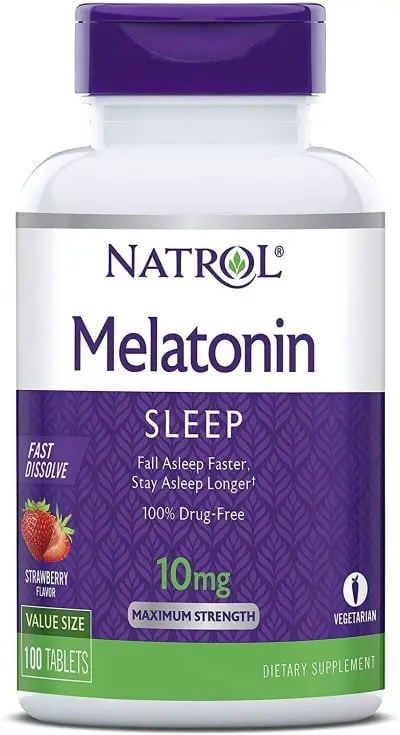
Can you take CBD oil with sleeping pills? – 4 risks you should know about and practical tips
By Jason Wooden, PhD | September 16, 2022
When taking CBD with sleeping pills, there’s the risk of doubling up on side effects, unwanted drug interactions, and various other downsides. There’s also the risk of CBD canceling out the sleep-effects of sleep meds in some individuals. For better results, it’s worth checking with a doctor and a specialist familiar with the use of CBD.
CONTENTS:
1) Making sense of taking CBD and sleeping pills
2) How they affect the body in different ways
3) Sleeping pills come with risks all by themselves
4) There’s even more risks when mixing CBD with sleeping pills
5) Practical tips for better results
6) Natural alternatives to CBD and sleeping pills
Making sense of taking CBD with sleeping pills…
If you’re wondering whether it’s safe to take CBD oil with sleeping pills, you’re likely not the only one.
Interest continues to grow in natural remedies for a wide variety ailments. However, with so much conflicting information and hype these days, it’s sometimes hard to know if you’re using a natural supplement in the best way.
There’s certainly been a lot of excitement around cannabinoid products.
CBD, short for cannabidiol, is one of the better known actives along with THC derived from the cannabis plant. Even though both are cannabinoids, they interact with the brain in slightly different ways.
CBD is made from hemp, a type of cannabis plant that contains very low levels of THC. Unlike THC, it is not psychoactive and doesn’t give you a “high”.
CBD is being looked at for a wide range of health benefits including anxiety and mood disorders, pain relief, and managing symptoms of neurological disorders such as Parkinson’s disease.
Despite the excitement, there’s still a lot of questions to be answered.
And it’s fair to ask whether there are any downsides from taking CBD at the same time with sleeping meds.
We’re going to take an honest look at what we know about the risks, what you can do about it, and then you can decide what makes the most sense for you.
How CBD and sleeping pills affect the body in different ways
The way CBD affects the body is through its interaction with proteins on the cells of the brain called cannabinoid receptors.
These receptors are part of the endocannabinoid system, a complex signaling system in the body that has been linked to appetite, mood, stress, learning and memory, inflammation, and pain. The endocannabinoid system is now believed to also be involved with regulating circadian rhythms and sleep too.
Unlike CBD, sleeping pills are taken specifically to help people fall asleep and stay asleep. They work on the brain but in different ways.
Milder sleep meds such as antihistamine drugs block histamine from binding to receptors on the brain involved in the sleep-wake cycle. This is what causes you to feel drowsy.
Prescription strenghth sleeping meds interact with proteins on the cells of the brain called GABA receptors. This silences the area of the brain that keeps you alert which causes you to feel sleepy.
So, while CBD and sleeping pills both affect the brain, they affect the body in very different ways for their specific different health effects. It’s no surprise if there’s more risk when taken together.
Sleeping pills come with risks all by themselves…
Before we talk about mixing CBD with sleeping pills, you should know there are definite risks from taking sleeping pills.
First, there’s the hangover effect which roughly 8 out of 10 people experience.
Next, there’s the list of varied side effects which you may experience:
- Dry mouth
- Headaches
- Muscle weakness
- Digestive issues (constipation, diarrhea, gas, heartburn, nausea)
There are other downsides for sleeping pills that come with long-term use – drug dependence, withdrawal symptoms, memory and attention problems, and rebound insomnia.
And lastly, some sleep medications may in rare cases trigger sleepwalking.
So, those are the risks when taking sleeping pills all by themselves. It’s for this reason they’re generally only recommended as a short-term remedy.
Next we’re going to look at what could happen when you add CBD to the mix.
The risks from mixing CBD with sleeping pills
It’s important to keep in mind that research on CBD is still ramping up. So, there’s a lot we don’t know about CBD’s possible interactions with other substances such as medications.
All the same, when taking CBD and sleeping pills together, the caution meter goes up a couple notches:
Risk 1: You could be doubling up on side effects
I’ve already mentioned the side effects from sleeping pills. The list of possible side effects from CBD include nausea, irritability, diarrhea, lightheadedness, fatigue, and dry mouth. (Notice the overlap?)
There’s the risk of doubling up on side effects when CBD is taken with other drugs with similar side effects.
Risk 2: Potential drug interactions
Among the known interactions to consider are:
- CBD can affect the levels of drugs normally broken down by the liver causing there to be too much or too little
- Using CBD with other drugs that slow brain activity can increase
Risk 3: Canceling out the sleep-inducing effects of sleep meds
Another CBD side effect to consider is that it’s actually been found to make some people feel more alert when taken at low or moderate doses. That’s because CBD is biphasic – It’s effects the body one way at a lower dose and the opposite way at a higher dose.
So, it’s possible your CBD could unknowingly counter-act the effects of sleeping pills when taken together.
Risk 4: Poor product quality
Unfortunately, it’s still a bit of the wild west when it comes to CBD products. It’s hard to know for some products how much CBD you’re actually getting in a dose and how pure it is.
A 2020 FDA survey of 102 CBD products found that 18 had less than the CBD amount indicated and 38 contained more than 120 percent of the amount of CBD indicated. They also found that 49% of the products contained THC.
IF there’s too much CBD present, that could mean even more unintended side effects and drug interactions.
IF there’s significant amounts of THC present, you could have unintended effects such as the “high” people get with marijuana and unintended drug interactions.

So, is it OK to take CBD with sleeping pills? It’s hard to answer that definitively right now because of the lack of research.
What we can do is take an honest look at your options.
Tips for avoiding unwanted downsides from CBD and sleeping pills together
If you decide you want to try taking both CBD and sleeping pills, there are some basic things that may help:
1) Avoid taking them at the same time of the day
You can try taking your CBD earlier in the day. This may help minimize the time in which you have both substances in your body.
Some people find they have to avoid taking CBD within 2 hours of bedtime in order to avoid possible insomnia.
2) Make sure you’re using a high quality CBD brand
I’ve already mentioned how widely CBD products can differ in quality. You can try getting your CBD from a different company.
Some things to look for are:
- A well-known and reputable company with minimal complaints
- 3rd party testing done to verify CBD amounts and purity
- A certificate of analysis which you can review
If you’re looking for options, here’s a high quality provider I use which I recently reviewed here.
3) Consult with someone
This is by far one of the best things you can do. In fact, you should let your doctor know if you’re regularly using CBD.
Your doctor can advise you about possible safety concerns if you’re taking it with sleeping pills and other medications.
Also, it’s worth talking to a doctor or some other specialist knowledgeable on the use of natural remedies like CBD.
An alternative medicine practitioner such as a naturopathic physician can advise you on proper use, dosing, and possible safety concerns. They can also recommend quality CBD products.
Natural alternatives for CBD and sleeping pills
Depending on your reasons for taking CBD with sleeping pills, there are natural alternatives for both that may be worth trying:

Melatonin
A hormone produced by the body that helps control your sleep-wake cycles, synthetic melatonin is one of the most commonly used sleeping aids

Lavender Essential Oils
Extracts prepared from the flowers of the lavender plant have been found to reduce anxiety and promote relaxation


Turmeric
Well-known for it’s powerful anti-oxidant and anti-inflammatory properties, it’s been used to help with ailments ranging from arthritis to heart disease.
Learn more:
How I’m using turmeric curcumin for inflammation, pain, and better sleep
Turmeric for insomnia
Turmeric for sleep apnea
And don’t forget about all the other natural drug-free things you can do for stress, anxiety, pain, and sleep:
- Exercise
- Mindfulness meditation Learn more
- Yoga
- Relaxation techniques such as progressive muscle relaxation and visualization
- Music therapy (soothing music and sounds) Learn more
- Tai chi
- Dietary changes such as an anti-inflammatory diet Learn more
- Cognitive behavioral therapy Learn more
Helpful CBD links:
You may also be interested in:
CBD:
How I‘m using Joy Organics CBD softgels for pain and better sleep
Can CBD oil make you feel more awake and cause insomnia?
Can CBD help with sleepwalking?
Can CBD really help sleep apnea? – What we know and 4 ways it might help
4 things to try if CBD is keeping your dog awake
Can CBD worsen IBS and insomnia?
Sleeping pills:
Can sleeping pills help with sleepwalking? – What we know and what else to try
Sources:
1. A comparison of CBD and THC, 2022, MedicalNewsToday
2. Cannabinoid Receptors and the Endocannabinoid System: Signaling and Function in the Central Nervous System. Int J Mol Sci. 2018 Mar; 19(3): 833.
3. CBD and Sleep, 2022, The Sleep Doctor
4. How Do Sleeping Pills Work? MOA And Usage, 2019, Addiction Resource
5. Sleeping Pills, Cleveland Clinic
6. Zolpidem-Induced Sleepwalking, Sleep Related Eating Disorder, and Sleep-Driving: Fluorine-18-Flourodeoxyglucose Positron Emission Tomography Analysis, and a Literature Review of Other Unexpected Clinical Effects of Zolpidem. J Clin Sleep Med. 2009 Oct 15; 5(5): 471–476.
7. CBD and other medications: Proceed with caution, Harvard Health Publishing
8. Cannabidiol (CBD): What we know and what we don’t, 2021, Harvard Health Publishing
9. What You Need to Know (And What We’re Working to Find Out) About Products Containing Cannabis or Cannabis-derived Compounds, Including CBD, 2020, FDA website
10. Safety of low dose cannabidiol, 2020, Australian Government report
11. Medical Fraud, Mislabeling, Contamination: All Common in CBD Products. Mo Med. 2020 Sep-Oct; 117(5): 394–399.
Connect with us:
About Us
Better Sleep Simplified® was founded as a place for you to get clear and well-researched information.
Our goal is to make sure you know about your options so that you take action sooner rather than later.
Check us out on YouTube:
Watch and Learn
Helpful sleep tips, interesting sleep facts and statistics you want to know about
Affiliate Disclosure
This site is a participant in the Amazon Services LLC Associates Program and other affiliate advertising programs designed to provide a means for sites to earn advertising fees by advertising and linking to them.
Important: BetterSleepSimplified.com is for informational purposes only and is not intended or implied to be a substitute for professional medical advice, diagnosis, or treatment. Always consult a physician for sleep and health concerns. See additional information.
